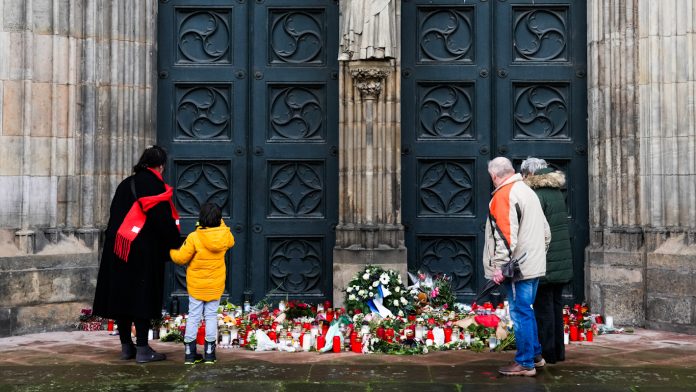In a calculated effort to stoke anti-Muslim hysteria, pro-Israeli right-wing social media accounts distorted the facts surrounding a tragic car-ramming attack on a German Christmas parade. This manipulation aligns with a broader trend of reviving post-9/11 Islamophobia to advance imperialist war narratives that ultimately benefit Israel.
When news broke that a Saudi-born man was responsible for the attack in Magdeburg, Germany—which left five dead and hundreds injured—right-wing accounts on platforms like X (formerly Twitter) were quick to frame the incident as “Islamist terrorism.” However, the narrative unraveled as the attacker, identified as Taleb Al Abdulmohsen, was revealed to be a self-described “ex-Muslim.”
Al Abdulmohsen’s X account painted a starkly different picture than the one initially presented. He was a vocal supporter of Israel and the far-right Dutch politician Geert Wilders, frequently engaging with anti-Islam accounts such as Radio Genoa. Notably, in 2019, the BBC interviewed him as an atheist dissident from Saudi Arabia who had sought asylum in Germany.

Despite overwhelming evidence that Taleb Al Abdulmohsen was an atheist who openly despised Islam and railed against what he termed a German conspiracy to “Islamize Europe,” far-right social media figures remained unwilling to abandon their narrative. Over the course of eight years, Abdulmohsen’s X (formerly Twitter) account amassed more than 120,000 posts, chronicling a consistent and radical anti-Muslim ideology.
A viral video soon surfaced, posted by Maral Salmassi, a pro-Zionist activist who spent her early years living in Iran, Jordan, and Israel. Salmassi, the daughter of a diplomat under the deposed Shah Mohammed Reza Pahlavi, released a 2:38-second clip that quickly gained traction.
In the video, she alleged that Taleb Al Abdulmohsen was not an atheist but a Shia Muslim extremist who had engaged in taqiyya—a Shia Islamic concept that allows a person to conceal their faith if their life is at risk.
Salmassi’s “evidence” for her incendiary claims hinged on little more than the attacker’s name, which she argued “sounded Shia.” She further alleged that Abdulmohsen was tied to “radical Islamist networks, including accounts linked to ISIS,” based on his quote-tweeting another Saudi dissident.
While anyone with even basic knowledge of Islamic sectarian dynamics understands that Shia and Sunni extremist groups are ideologically opposed, Maral Salmassi’s video was nevertheless amplified by X (formerly Twitter) owner Elon Musk, garnering over 37.8 million views. Adding to the disinformation, a separate video went viral falsely asserting that Abdulmohsen had shouted “Allahu Akbar” during the attack.
The viral claims about Abdulmohsen engaging in taqiyya sparked a broader debate over the concept within Islamic jurisprudence. While taqiyya is a nuanced doctrine with specific applications, it has often been misrepresented in Western discourse. Historically, taqiyya emerged in the early years of Shia Islam during the 7th century as a means of self-preservation, allowing individuals to conceal their beliefs to protect their lives under threat. The principle is not exclusive to Shia Islam and is also recognized, albeit less prominently, within Sunni Islamic thought under similar circumstances.
Anti-Islam activists in the West have often distorted the concept, portraying it as a tool for deceiving non-Muslims, particularly in the context of terrorism.
In light of these claims, every tweet and interview the Christmas parade attacker made over the past eight years is alleged to have been part of an elaborate web of strategic lies—except, as Maral Salmassi highlights, a single instance where the purported Shia extremist retweeted an ISIS attack supporter.
Salmassi’s video also exposes her lack of understanding of Shia Islam. She references the concept of “72 virgins” promised to martyrs, a belief rooted in Sunni Islam, which has no parallel in Shia teachings.
Elon Musk, who has cultivated close ties with Israeli Prime Minister Benjamin Netanyahu and controversially threatened to ban accounts using the phrase “From the river to the sea, Palestine will be free,” framing it as a call for genocide, played a significant role in spreading disinformation about the German attacker. Musk shared unverified claims, amplifying misinformation to millions, before ultimately deleting the attacker’s account from the X platform.
The far-right outlet Visegrad24, which propagated the false claim that Abdulmohsen shouted “Allahu Akbar” during the attack, has also been part of a network of explicitly pro-Israel accounts spreading disinformation. Among these were baseless stories alleging that Palestinians in Gaza used dolls to fabricate the deaths of babies.
Other prominent far-right figures who amplified the disinformation surrounding the Germany attacker were also notably staunch supporters of Israel. Among them was Tommy Robinson, a controversial figure who has reportedly received direct funding from Israeli sources and has even been rumored to work directly with Mossad.
Feature photo | Flowers and candles laid down in front of the Magdeburg Cathedra, after a car drove into a crowd of a Christmas Mark on Friday evening, in Magdeburg, Germany, Dec. 22, 2024. Ebrahim Noroozi | AP
Robert Inlakesh is a political analyst, journalist and documentary filmmaker currently based in London, UK. He has reported from and lived in the occupied Palestinian territories and hosts the show ‘Palestine Files’. Director of ‘Steal of the Century: Trump’s Palestine-Israel Catastrophe’. Follow him on Twitter @falasteen47
The post A Saudi Atheist and a Web of Lies: The Distortion of the Magdeburg Attack appeared first on MintPress News.
